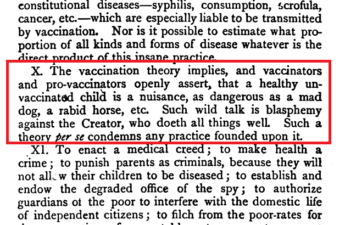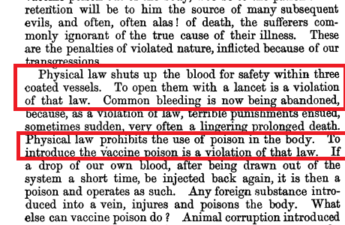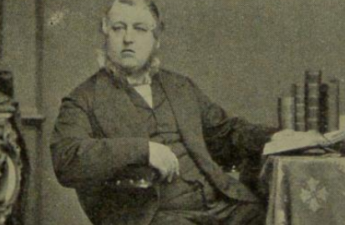
Reverend John Newton (1725-1807) was an Anglican clergyman and author of the beloved hymn “Amazing Grace.” A former slave trader, he later became a Christian and ultimately repented of the trade. He would go on to help William Wilberforce in his successful campaign to end the horrific practice.
Near the end of his life, Newton said,
My memory is nearly gone; but I remember two things: That I am a great sinner, and that Christ is a great Savior.
What might Newton say about vaccination today? During Newton’s day, the process of smallpox variolation, or inoculation, was practiced.
Practically speaking, the process is the same as vaccination, as both procedures insert poisons into the bloodstream in the name of preventing disease. The real difference is just the name. And just like vaccination, variolation or inoculation was a dangerous procedure that killed and injured many.
With this being said, Newton, in a letter, has some interesting comments on smallpox inoculation, which, for reasons given above, can just as much apply to vaccination. While we wish in this letter Newton would have rebuked the pro-inoculation position instead of tolerating it, he nevertheless gives good reasons to avoid inoculation.
Here is an excerpt:
“My times are in the Lord’s hands; I am now in health, and am not willing to bring upon myself a disorder [via inoculation], the consequences of which I cannot possibly foresee … I choose to wait [God’s] appointment, and not to rush upon even the possibility of danger without a call. … Let me fall into the hands of the Lord (for his mercies are great) and not into the hands of men.” — John Newton
The full letter is below. Here is a summary:
- Newton says he is not pro-inoculation
- Newton gives reasons why some Christians may support inoculation, and says he may not be able to dissuade them otherwise (I think here he is being too tolerant of the pro-inoculation position)
- Newton then gives reasons why one might refuse inoculation:
- It is better to not harm oneself with inoculation when one is already in good health
- If one is going to get smallpox, it is better to catch it naturally in God’s providence than to rush into the possibility of danger and make a smallpox infection happen via inoculation. God, working in the natural realm, is the best judge as to when someone should catch smallpox.
- There is no reason to fear catching smallpox in the natural way since God is in control.
- If one catches smallpox in the natural way, then that time of trial will be an opportunity for sweet consolations from the Lord.
- If harm comes from inoculation, then one has oneself to blame for taking his care out of God’s hands.
- It is better to fall into the hands of a merciful God than into the hands of men (that is, the dangerous inoculaters)
- Newton then notes that if we trust the Lord with our souls, then we should also do so with our bodies
- Newton says that regarding a friend of the letter’s recipient, he cannot blame her if she avoids inoculation and simply trusts in the Lord
John Newton’s letter to a one Rev. Mr. R.
DEAR SIR , June 3, 1777.
It seems I must write something about the small pox, but I know not well what: not having had it myself, I cannot judge how I should feel if I were actually exposed to it. I am not a professed advocate for inoculation; but if a person who fears the Lord should tell me, “I think I can do it in faith, looking upon it as a salutary expedient, which he in his providence has discovered, and which, therefore, it appears my duty to have recourse to, so that my mind does not hesitate with respect to the lawfulness, nor am I anxious about the event; being satisfied, that whether I live or die, I am in that path in which I can cheerfully expect his blessing,”—I do not know that I could offer a word by way of dissuasion.
If another person should say, “My times are in the Lord’s hands; I am now in health, and am not willing to bring upon myself a disorder, the consequences of which I cannot possibly foresee: If I am to have the small- pox, I believe he is the best judge of the season and manner in which I shall be visited, so as may be most for his glory and my own good; and therefore I choose to wait his appointment, and not to rush upon even the possibility of danger without a call. If the very hairs of my head are numbered, I have no reason to fear that, supposing I receive the small-pox in a natural way, I shall have a single pimple more than he sees expedient; and why should I wish to have one less ? Nay, admitting, which however is not always the case, that inoculation might exempt me from some pain and ‘inconvenience, and lessen the apparent danger, might it not likewise, upon that very account, prevent my receiving some of those sweet consolations, which I humbly hope my gracious Lord would afford me, if it were his pleasure to call me to a sharp trial? Perhaps the chief design of this trying hour, if it comes, may be to show me more of his wisdom, power, and love, than I have ever yet experienced. If I could devise a mean to avoid the trouble, I know not how great a loser I may be in point of grace and comfort. Nor am I afraid of my face ; it is now as the Lord has made it, and it will be so after the small-pox. If it pleases him, I hope it will please me. In short, though I do not censure others, yet, as to myself, inoculation is what I dare not venture upon. If I did venture, and the issue should not be favourable, I should blame myself for having attempted to take the management out of the Lord’s hand into my own, which I never did yet in other matters, without finding I am no more able than I am worthy to choose for myself. Besides, at the best, inoculation would only secure me from one of the innumerable natural evils the flesh is heir to; I should still be as liable as I am at present to a putrid fever, a bilious cholic, an inflammation in the bowels or in the brain, and a thousand formidable diseases which are hovering round me, and only wait his permission to cut me off in a few days or hours: and therefore I am determined by his grace, to resign myself to his disposal. Let me fall into the hands of the Lord (for his mercies are great) and not into the hands of men.”
If a person should talk to me in this strain, most certainly I could not say, “Notwithstanding all this, your safest way is to be inoculated.”
We preach and hear, and I hope we know something of faith, as enabling us to intrust the Lord with our souls: I wish we had all more faith , to intrust him with our bodies, our health, our provision, and our temporal comforts likewise. The former should seem to require the strongest faith of the two. How strange is it, that when we think we can do the greater, we should be so awkward and unskilful when we aim at the less! Give my love to your friend. I dare not advise; but if she can quietly return at the usual time, and neither run intentionally into the way of the small-pox, nor run out of the way, but leave it simply with the Lord, I shall not blame her. And if you will mind your praying and preaching, and believe that the Lord can take care of her without any of your contrivances, I shall not blame you; nay, I shall praise him for you both. My prescription is, to read Dr. Watts, Psal. cxxi. every morning before breakfast, and pray it over till the cure is effected. Probatum est.
Hast thou not given thy word To save my soul from death?
And I can trust my Lord,
To keep my mortal breath .
I’ll go and come,
Nor fear to die,
Till from on high Thou call me home.
Adieu. Pray for yours.
Cited in John Newton, Cardiphonia, Or, The Utterance of the Heart, in the Course of a Real Correspondence (London: Hamilton, Adams & Company, 1780), 363-365.
If you find this site helpful, please consider supporting our work.


